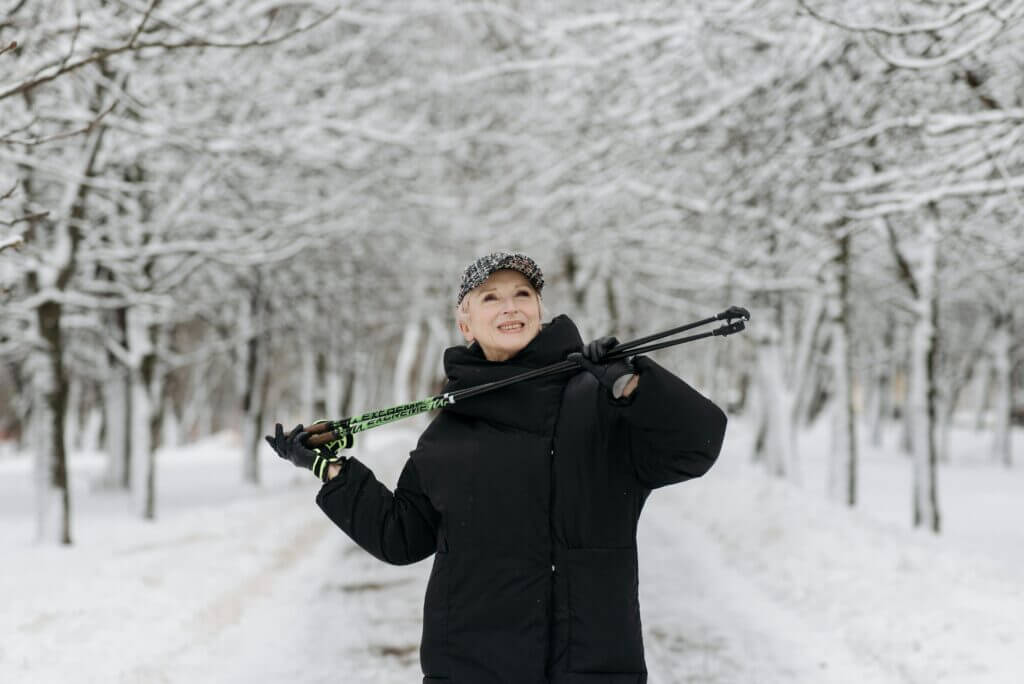The winter season can bring beautiful moments but also presents unique challenges for seniors. Cold temperatures, icy surfaces, and shorter days can make it difficult to maintain physical activity, impacting both mental and physical well-being. However, following essential winter tips allows older adults to stay safe, healthy, and active during these colder months. A holistic approach that addresses nutrition, movement, sleep, social interaction, and mental health will help seniors thrive in the winter months and maintain peace of mind.

Boost Your Immune System with Foods Rich in Nutrients
A strong immune system is crucial during the winter season, as cold weather and close contact indoors increase the risk of illnesses such as the flu. Seniors should focus on a nutrient-rich diet to support immune function and manage chronic health conditions.
- Incorporate Immune-Boosting Foods: Foods rich in vitamins C and D help strengthen immune systems. Vitamin C can be found in citrus fruits, bell peppers, and spinach, while fatty fish, fortified dairy, and supplements are good sources of vitamin D. Since seniors may not get enough sunlight during the winter months, a vitamin D supplement might be beneficial.
- Include Lean Proteins and Antioxidants: Lean proteins like chicken, fish, and legumes support muscle health and provide energy for everyday activities. Berries, nuts, and seeds are packed with antioxidants, which protect cells from damage and enhance immune systems.
- Stay Hydrated Even in Cold Weather: It’s easy to forget about hydration during the colder months, but staying hydrated is essential for healthy body functions. Warm beverages like herbal teas or broth are comforting options that help maintain body temperature and support mucous membranes, which are vital to immune defense.
Stay Active with Safe Exercise Programs and Indoor Activities
Maintaining physical activity during the winter months is essential for heart health, mobility, and mental health. Exercise also helps regulate heart rate, manage chronic conditions, and reduce the risk of heart disease. Seniors should look for safe ways to stay active, whether indoors or outdoors.
- Indoor Activities for Fitness: Consider exercise classes or senior-friendly exercise programs for older adults, such as chair yoga, tai chi, or light stretching routines. These activities can improve flexibility, balance, and strength without leaving home. Many senior centers also offer virtual or in-person exercise programs during the winter season.
- Outdoor Movement When Weather Permits: On mild days, bundle up and enjoy short walks to get fresh air and sunlight. However, be cautious of icy surfaces and check weather forecasts to avoid slipping hazards. Using footwear with good traction and walking aids like canes or walkers adds stability.
- Adapt Everyday Activities: Household chores like sweeping or light cleaning count as physical activity and can help you stay active without straining your body. The goal is to keep moving, even if the activities are gentle. A resilient person can stay motivated by setting small, achievable fitness goals to stay active throughout the colder months.
Maintain Mental Health and Social Interaction to Stay Engaged
Winter can be a challenging time for mental health, especially for seniors who may feel isolated during the holiday season. Shorter days and colder temperatures can lead to seasonal affective disorder (SAD) or feelings of loneliness. Staying connected and engaged is essential for emotional well-being.
- Foster Social Interaction: When possible, make an effort to stay in touch with family and friends through phone calls, video chats, or in-person visits. Senior centers often organize indoor activities and social events, providing a great opportunity to meet others and stay socially engaged.
- Participate in Meaningful Activities: Find hobbies or creative outlets that bring joy, such as painting, puzzles, or journaling. These activities provide peace of mind and help reduce stress. Practicing mindfulness techniques like meditation or deep breathing exercises can also promote relaxation and improve mental health.
- Create a Cozy, Well-Lit Environment: Winter’s darker days can affect mood, so brighten your living space with warm lighting and soft blankets to create a comfortable environment. Indoor plants or seasonal decorations can further enhance your space, lifting your spirits during the challenging winter season.
Prioritize Sleep and Good Hygiene for Overall Well-Being
Quality sleep and hygiene play a significant role in maintaining health during colder months. Proper rest strengthens immune systems, while hygiene practices reduce the risk of illness.
- Improve Sleep for Better Health: Aim for 7-9 hours each night to restore energy and support mental health. Create a comfortable sleep environment with layered blankets, and consider using a humidifier to prevent dry air. A consistent bedtime routine—such as reading or listening to soothing music—can help you fall asleep more easily.
- Practice Good Hygiene to Prevent Illness: Winter increases the risk of seasonal illnesses. Regular handwashing with soap is essential, and carrying hand sanitizer can help when you’re on the go. Get a flu shot and stay updated on other recommended vaccines to protect against infections.
- Skincare to Combat Dryness: Cold temperatures can dry out your skin, so moisturize regularly with fragrance-free lotions to prevent irritation. Don’t forget to apply lip balm and hand cream, as these areas are prone to cracking in colder weather.
Prepare for Winter with Safety and Medical Care in Mind
Seniors should take a few extra precautions to ensure safety during the winter season. Preparing for potential emergencies, staying informed about weather forecasts, and managing chronic conditions are essential winter tips for seniors.
- Prevent Falls and Injuries: Use footwear with non-slip soles and be cautious on icy surfaces. Keep walkways clear of snow, or ask for help if needed. A fall on icy ground can lead to severe injuries or even loss of consciousness, so take extra care outdoors.
- Monitor Medical Conditions: Winter can worsen chronic conditions like arthritis or respiratory issues. Keep in close contact with your healthcare provider and have an emergency plan in case of a medical emergency. Ensure you have enough medications and essential supplies in case bad weather prevents trips to the pharmacy.
- Stay Warm and Comfortable: Dress in layers to regulate body temperature and keep your home comfortably heated. If heating costs are a concern, explore energy assistance programs for seniors to ensure you stay warm and safe throughout the winter season.
Conclusion: Thrive with These Essential Winter Tips for Seniors
Although the winter months bring cold weather and new challenges, seniors can take proactive steps to stay healthy and active. Focusing on physical activity, social interaction, and mental health will help maintain physical and emotional well-being. A nutritious diet with foods rich in vitamins, good sleep hygiene, and regular exercise programs will keep immune systems strong and resilient.
With the proper preparation and support, seniors can navigate the winter season safely, enjoy everyday activities, and maintain peace of mind. By embracing these essential winter tips, older adults can thrive during this challenging time and look forward to the brighter days ahead.
Click here to check out our article on Ten Things You Should Know Before Retiring!







